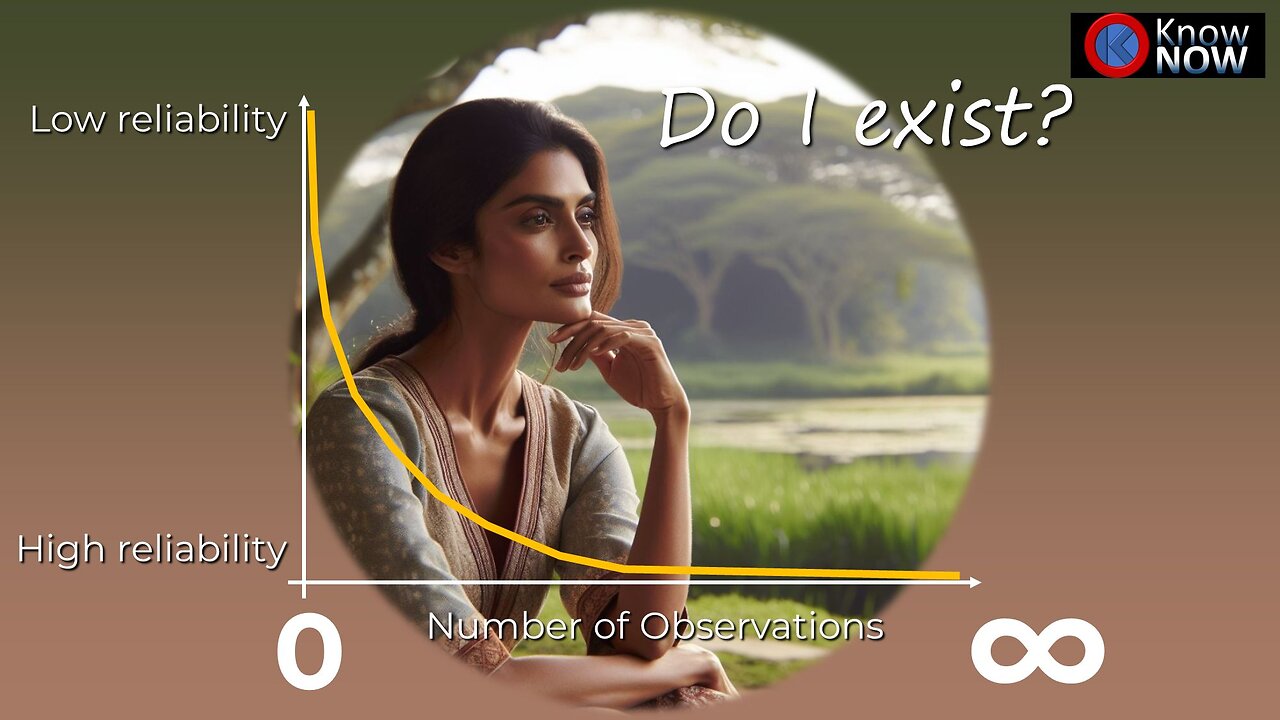Premium Only Content

Objective Reality - an Asymptotic Measure of Reliability of Existence?
Video by KNOW (KnowNow).
Objective Reality: Does It Truly Exist?
The concept of “objectivity” has long been central to philosophy and science, often defined as that which exists independent of perception.
We are thought to assume that “reality” exists independently of our perception, i.e. that things “objectively exist”. We refer to them often as “facts”.
Upon closer examination, the definition of “objective reality” presents several challenges. If all knowledge is filtered through perception, how can we ever claim something is truly independent of it? Furthermore, if objectivity is merely the sum of subjective observations, does it become nothing more than an accepted consensus rather than an independent truth? In this video, we will explore these questions, ultimately considering whether objective reality exists at all or if it is merely an asymptotic concept—one that can be approached but never fully attained.
Defining Objectivity: Independence vs. Consensus
A traditional definition of objectivity posits that it refers to something that exists independent of perception. This seems to suggest that even if no one were present to observe it, an objective fact would remain true. A tree may fall in the forest and make sound, even if no one is there to see it or hear it.
However, this immediately leads to a paradox: how can we know that something exists outside of perception when all knowledge is derived from the perception, including the very same idea we have about it?
If we attempt to define objectivity in terms of consensus — meaning something is objective if it is reliably confirmed by multiple observers (in science we call it “accepted as true”) — then we run into another issue. Consensus is still built on individual subjective experiences. Just because a majority agrees on something does not make it fundamentally independent of perception, as future observations may contradict prior beliefs.
For instance, if the entire world agreed that a particular painting was beautiful, that would not make the beauty of that painting an objective fact; it would simply reflect a widely held subjective opinion. There still may be that one guy who will not find it beautiful. Even if we interview all people in the world, there still could be someone in the future. Or maybe someone lied? They lied under peer pressure but did not really find the painting beautiful. This suggests that defining objectivity as merely intersubjective agreement is flawed. Instead, we must look for a definition that avoids reliance on both individual perception and collective agreement.
Objectivity as an Asymptotic Measure of Reliability
A more refined approach to objectivity might involve reliability rather than absolute independence. That is, something is "objective" not because it exists apart from perception but because it demonstrates consistent patterns across independent observations. The key here is repeatability: if a phenomenon can be measured and produces the same results under the same conditions, it becomes more “reliable” and, thus, “more objectively valid”.
However, “reliability” is not a binary concept—it exists on a continuum. The more consistently something can be verified, the closer it comes to what we might call "true objectivity." In this way, objectivity is best understood as an asymptotic concept: a theoretical limit we can approach but never reach with absolute certainty. Science itself operates under this principle. Newton's laws of motion, for instance, were once considered objective truths, yet they were later refined by Einstein’s theory of relativity. Scientific knowledge becomes increasingly reliable over time, but it never reaches a final, absolute state.
The Case of Zero and Infinity: Do They Exist?
This approach to objectivity bears an interesting resemblance to mathematical concepts like zero and infinity. Neither zero nor infinity exist in a tangible sense; they are ideas that help us describe reality rather than things that have independent existence. Zero represents the absence of quantity, but there is no physical "zero" in nature. Similarly, infinity is not a place or object but a limit—something that can be approached conceptually but never fully grasped in a finite system.
If we accept that zero and infinity do not "exist" in a traditional sense but are still useful constructs, then the same logic might apply to objective reality. Perhaps objectivity does not exist as a literal, independent state but rather as a conceptual framework that allows us to make sense of the world. It is not something we discover in a pure form but something we define through repeated observation and refinement.
Conclusion: Is Objective Reality a Useful Fiction?
-
 LIVE
LIVE
Jeff Ahern
38 minutes agoNever Woke Wednesday with Jeff Ahern
123 watching -
 13:43
13:43
The Kevin Trudeau Show Limitless
5 hours agoClassified File 3 | Kevin Trudeau EXPOSES Secret Society Brainwave Training
1.5K4 -
 1:05:33
1:05:33
Russell Brand
3 hours agoTrump Goes NUCLEAR on China - accuses Xi of CONSPIRING against US with Putin & Kim - SF627
93.7K39 -
 1:14:47
1:14:47
Sean Unpaved
3 hours agoTrey Wingo's Gridiron Grab
9.68K1 -
 13:07
13:07
Silver Dragons
21 hours agoBullion Dealer Reacts to SILVER PRICE SURGING!
1.54K5 -
 1:06:28
1:06:28
Timcast
3 hours agoTrump Admin Threatens GOP Who Vote To Release Epstein Files
129K95 -
 2:13:09
2:13:09
Side Scrollers Podcast
4 hours agoDruski/White Face Controversy + Women “Experience Guilt” Gaming + More | Side Scrollers Live
22.5K3 -
 1:39:53
1:39:53
The Mel K Show
3 hours agoMORNINGS WITH MEL K - Narratives Implode as Light Shines on Covid Deception 9-3-25
17.6K7 -
 2:25:56
2:25:56
The Shannon Joy Show
3 hours agoExclusive With Congressman Tom Massie: "The Epstein Files Are NOT A Hoax. There Are Real Victims"
12.1K2 -
 1:52:46
1:52:46
Steven Crowder
6 hours agoCongress Drops New Epstein Files and Trump Drops New Bombs on Venezuela Terrorists
307K183